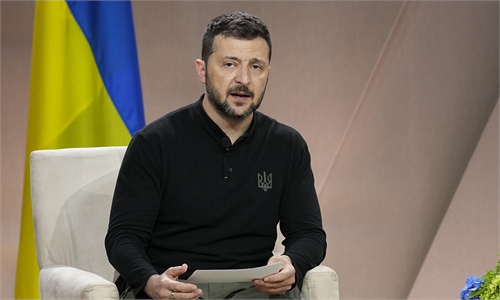Europe asserts its role in Ukraine crisis with partial truce proposal
EU wants voice to be heard, but security framework hinges on how it addresses ties with Russia: experts

UK prime minister Keir Starmer and Ukrainian President Volodymyr Zelensky witness UK's chancellor of the exchequer Rachel Reeves signing a deal in support of Ukraine at Downing Street in London on March 1, 2025. Photo: VCG
European leaders are pushing for a partial one-month truce between Russia and Ukraine while intensifying efforts to form a "coalition of the willing" to bolster Kiev, following European leaders' summit in London on the Ukraine crisis. The moves came after a shouting match between US and Ukrainian presidents in the White House, which raised doubts about the continuation of American aid to Ukraine and prompted Europe to assert its role, expert said.
Chinese experts noted that these steps highlight Europe's frustration with US' marginalization in resolving the Ukraine crisis, stressing that Europe, as a key stakeholder, demands its voice be heard. However, they cautioned that Europe must also confront an unavoidable reality: the future of Europe's security framework hinges on how it addresses its relationship with Russia.
French President Emmanuel Macron told Le Figaro on Sunday that France and Britain propose a one-month truce excluding ground combat, Reuters reported Monday.
The initial phase of a French-British alternative peace deal for Ukraine would involve a month-long "truce in the air, on the seas and energy infrastructures," according to Macron speaking to the French outlet. The second phase would involve troops on the ground, CNN reported.
Macron also suggested that European countries should raise their defense spending to between 3.0 and 3.5 percent of GDP to respond to Washington's shifting priorities and Russia's militarization, AFP said.
Simultaneously, British Prime Minister Keir Starmer announced that the UK, France and other countries will step up their efforts in a "coalition of the willing" and seek to involve the US in their support for Ukraine. At a London summit with 18 European leaders, including Zelensky, Starmer pledged £1.6 billion ($2 billion) in export financing for over 5,000 air defense missiles.
Li Haidong, a professor at China Foreign Affairs University, told the Global Times on Monday that "Europe seeks sway in both the Ukraine crisis and the continent's security landscape, signaling it's no bystander." He added that these efforts reflect Europe's discontent with Washington's sidelining of Europe in talks with Russia.
Awkward position
CNN framed Europe's moves as a way to "wrestle control of negotiations" over the Russia-Ukraine conflict away from the US and "present a united front" amid a meltdown in relations between Kiev and Washington.
During the European leaders' talk in London on Sunday, European Commission chief Ursula von der Leyen warned that "We urgently have to rearm Europe … And prepared for the worst," according to the Euro News.
Citing sources, the New York Times reported that US President Donald Trump will discuss on Monday local time with his top national security aides on the possible suspension or complete cancellation of military aid to Ukraine, including weapons pledged by the Biden administration.
According to the International Institute for Strategic Studies (IISS), in the event of a total cancellation of American military assistance to Ukraine, European nations would have to allocate an additional $100 billion to $350 billion to support Ukraine's military and enhance their own military-industrial capabilities.
Despite Starmer saying that European leaders have reached a four-point plan with Ukraine to end the conflict, he said that the agreement "would need US backing and had to include Russia," emphasizing that "I do not accept that the US is an unreliable ally," per the BBC.
Europe is currently in the awkward position - it wishes to show leadership in peace talks and even in the post-war security architecture, but on the other hand, Europe's own military capabilities, and the efficiency of coordination in defense, lag behind its own ambition and initiatives, especially with US' absence, Li said.
Europe's plans have drawn criticism from Russia. In an interview with Russian newspaper Krasnaya Zvezda on Sunday, Foreign Minister Sergei Lavrov accused the European powers which have rallied around Kiev of seeking to prolong the conflict, according to the Guardian.
Lavrov said that after Biden's administration, "people have come in who want to be guided by common sense. They say directly that they want to end all wars, they want peace. And who demands a 'continuation of the banquet' in the form of a war? Europe."
Kremlin spokesperson Dmitry Peskov on Monday accused President Zelensky of not wanting peace. "Someone should make him want peace. If the Europeans do it, all kudos to them," said Peskov, per AFP.
"Europe's view of Russia as a significant threat dims short-term detente prospects. However, in the long run, the adjustment of Europe's security framework hinges on the question of how Europe manages its relationship with Russia," Feng Zhongping, director of the Institute of European Studies at the Chinese Academy of Social Sciences, told the Global Times on Monday.
At present, Europeans have yet to seriously grapple with this question, which is something they ought to reflect on, Feng said, noting that without a proper and timely resolution, Europe risks remaining a continent plagued by conflict and instability.
Europe stands at a critical juncture, which will determine whether it can truly establish a sustainable and long-lasting security framework rooted in the principle of indivisible security, Li said.


